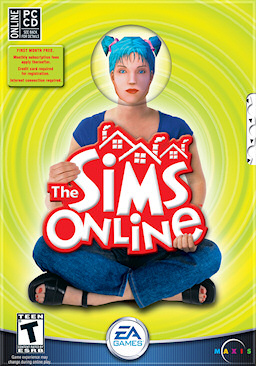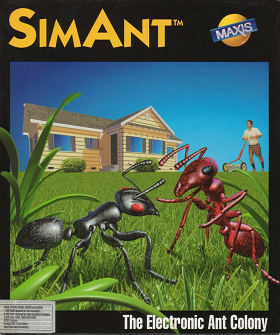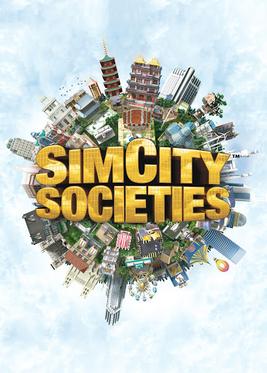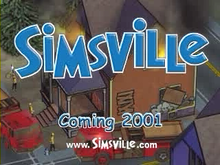
SimCity is a city-building simulation video game developed by Will Wright, and released for several platforms from 1989 to 1991. SimCity features two-dimensional graphics and an overhead perspective. The game's objective is to create a city, develop residential and industrial areas, build infrastructure, and collect taxes for further city development. Importance is placed on increasing the population's standard of living, maintaining a balance between the different sectors, and monitoring the region's environmental situations to prevent the settlement from declining and going bankrupt.

The Sims is a social simulation video game developed by Maxis and published by Electronic Arts in 2000. The game allows players to create and control virtual people, called "Sims", and manage their daily lives in a suburban setting. The game features an open-ended gameplay, where players can choose their own goals and objectives, and customize their Sims' appearance, personality, skills, relationships, and environment. A series of expansion packs were also released that add new content and features to the game, such as new careers, items, locations, and scenarios.

SimCity 3000 is a city building simulation video game released in 1999, and the third major installment in the SimCity series. It was published by Electronic Arts (EA) and developed by series creator Maxis. It was released for Microsoft Windows, Macintosh, and, through an arrangement with Loki Games, Linux.

The Sims Online was a 2002 massively multiplayer online game (MMO) developed by Maxis and published by Electronic Arts (EA) for Microsoft Windows. The game was a subscription-based online multiplayer version of the 2000 Maxis game The Sims, in which players could interact with others on virtual user-made lots, buy and customise properties, and make in-game money by taking on jobs. The Sims Online was the project of Maxis founder and Sims creator Will Wright, who sought to create an open-ended online game based on social interaction, with ambitions for the game to be a platform for emergent gameplay and the creation of virtual societies and politics. In line with these ambitions and the prior commercial success of The Sims, The Sims Online received considerable pre-release coverage, with expectations that it would be successful and break new ground for online multiplayer games.

SimAnt: The Electronic Ant Colony is a 1991 life simulation video game by Maxis and the company's third product, focusing on the lifecycle of ants. It was designed by Will Wright. In 1992, it was named "Best Simulation Game" at the Software Publishers Association's Codie awards. SimAnt was re-released in 1993 as part of the SimClassics Volume 1 compilation alongside SimCity Classic and SimLife for MS-DOS, Mac and Amiga. In 1996, SimAnt, alongside several of Maxis' simulation games were re-released under the Maxis Collector Series with greater compatibility with Windows 95 and differing box art, including the addition of Classics beneath the title.

The Sims 2 is a 2004 social simulation video game developed by Maxis and published by Electronic Arts. It is the second major title in The Sims series, and is the sequel to The Sims. The game was released for Microsoft Windows on September 14, 2004, and a port for MacOS by Aspyr was released on June 17, 2005. Eight expansion packs and nine "stuff packs" were subsequently released between 2005 and 2008. In addition, versions of The Sims 2 were released on various video game consoles, including the PlayStation 2, Xbox, Nintendo DS, and GameCube, and mobile platforms, including the Nokia Ovi Store. Unlike the original, the handheld and console versions are more storyline-based. The three handheld versions of the game are completely different among themselves, unlike the home console versions of the game, which are virtually identical to each other. A sequel, The Sims 3, was released in June 2009.

Republic: The Revolution is a video game produced by Elixir Studios and published by Eidos Interactive and for Mac OS X by Feral Interactive. The game is a political simulation in which the player leads a political faction to overthrow the government of a fictional totalitarian country in Eastern Europe, using diplomacy, subterfuge, and violence. Development of Republic was led by Elixir Studios, a company by founder Demis Hassabis, who had previously worked on simulation games for Bullfrog Productions and Lionhead Studios. Design of the game was ambitious, with the game experiencing media hype from Demis Hassabis' descriptions of the game as a highly detailed and realistic simulation of political dynamics. The game experienced several delays, leading to the restriction of the scope of the game's features and scale.

The Sims Bustin' Out is a video game developed by Maxis and published by Electronic Arts in 2003 for the PlayStation 2, Xbox, GameCube, Game Boy Advance, and in 2004 for the N-Gage. It is the second title in The Sims console series and the first title not concurrently released on Windows PC.

The Sims: Hot Date is a 2001 expansion pack for The Sims developed by Maxis and published by Electronic Arts. The expansion adds a new community area to the game, Downtown, and provides players with more opportunities for their Sims to interact and romance one another. Upon release, Hot Date received generally favorable reviews, with praise directed to the game's expansion of game mechanics and locations in contrast to earlier expansions, although with some criticism of the limited options for customisation and the level of challenge with relationship management. Following release, Hot Date was a commercial success, becoming one of the top ten highest-selling computer games of 2001 and 2002 in the United States.

Life simulation games form a subgenre of simulation video games in which the player lives or controls one or more virtual characters. Such a game can revolve around "individuals and relationships, or it could be a simulation of an ecosystem". Other terms include artificial life game and simulated life game (SLG).

Beach Life is a business strategy video game for Windows developed by Deep Red Games, published by Eidos Interactive and released in September 2002.
SimCity is an open-ended city-building video game franchise originally designed by Will Wright. The first game in the series, SimCity, was published by Maxis in 1989 and was followed by several sequels and many other spin-off Sim titles, including 2000's The Sims, which itself became a best-selling computer game and franchise. Maxis developed the series independently until 1997, and continued under the ownership of Electronic Arts until 2003. EA commissioned various spinoffs from other companies during the 2000s, focusing on console and mobile releases. A 2013 EA-Maxis reboot was subject to what has been described as "one of the most disastrous launches in history", which may have triggered the 2015 shutdown of Maxis Emeryville and the end of the franchise.

SimCity Societies is a city-building simulation video game developed by Tilted Mill Entertainment and published by Electronic Arts, and is part of the SimCity series. The gameplay is significantly different from previous SimCity titles, with a greater focus on social development. SimCity Societies was released in 2007, and received mixed reviews, with praise for the game's improved accessibility and visuals, but criticism for being oversimplified and having poor performance.

SimCity is a city-building and urban planning simulation massively multiplayer online game developed by Maxis Emeryville and published by Electronic Arts. Released for Microsoft Windows in early March 2013, it is a reboot of the SimCity series, and is the first major installment since the release of SimCity 4 a decade before. A macOS version was released on August 29, 2013.

The Sims is a series of life simulation video games developed by Maxis and published by Electronic Arts. The franchise has sold nearly 200 million copies worldwide, and is one of the best-selling video game series of all time. It is also part of the larger Sim series, started by SimCity in 1989.

The Sims Medieval is a life simulation game that was released in March 2011 by Electronic Arts for Microsoft Windows and Mac OS X, and on September 22, 2011 for iOS, as part of The Sims series. It was also made available for Windows Phone on March 26, 2013. Set in medieval times, it allows the player to build a kingdom through quest-driven gameplay. During presentation at E3 2010, a pre-order exclusive Limited Edition was also available.

Forza is a racing video game series for Xbox consoles and Microsoft Windows published by Xbox Game Studios. The franchise has sold 16 million copies as of December 2016 and has garnered critical acclaim.

The Sims 4 is a social simulation game developed by Maxis and published by Electronic Arts. The game was released on September 2, 2014 for Windows, and is the fourth main installment in The Sims series, following The Sims 3 (2009). As with previous games in the series, The Sims 4 allows players to create and customize characters called "Sims", build and furnish their homes, and simulate their daily life across various in-game regions. This installment introduced a newly developed custom game engine, with enhanced character creation and house-building tools, along with a more complex in-game simulation.

Cities: Skylines is a 2015 city-building game developed by Colossal Order and published by Paradox Interactive. The game is a single-player open-ended city-building simulation. Players engage in urban planning by controlling zoning, road placement, taxation, public services, and public transportation of an area. They also work to manage various elements of the city, including its budget, health, employment, traffic, and pollution levels. It is also possible to maintain a city in a sandbox mode, which provides more creative freedom for the player.

The Sims 2: Nightlife is an expansion pack for the 2004 life simulation video game The Sims 2, developed by Maxis and published by Electronic Arts. The second expansion pack for the game, it was released 15 September 2005. Nightlife expands the game's social and romantic interactions, introducing elements such as romantic chemistry and a formal dating minigame. It also introduces "downtown" neighbourhoods that house community lots such as bars, clubs, and restaurants; changes to the game's handling of objects, including a full inventory system; and new gameplay options, such as the ability to turn sims into vampires.




















